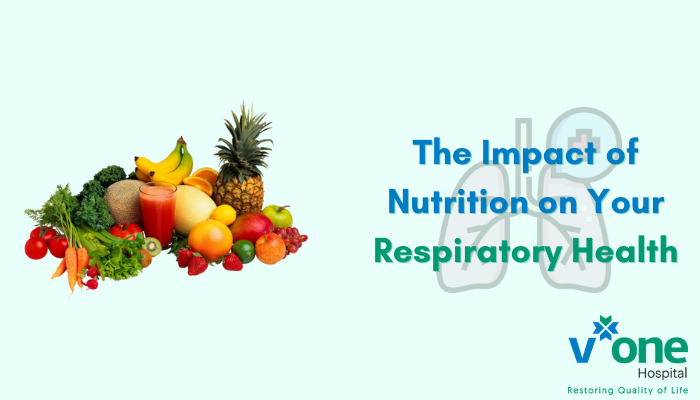The Impact of Nutrition on Your Respiratory Health | Healthy Diet, Healthy Lungs
Did you know that from nutrient deficiencies and inflammation caused by unhealthy diets to obesity and environmental pollutants, everything has the capacity to affect how you breathe?
Your lungs play a key role in supplying oxygen to your body. The respiratory system’s function depends on the efficient exchange of gasses between the lungs and the bloodstream, and several factors, including nutrition, can affect this process. Nutrition has been shown to play a critical role in respiratory health, and making appropriate dietary choices go a long way in preventing or managing respiratory conditions. The nutrition you receive plays a key role in the state of your respiratory health, and by choosing healthier dietary patterns, you can gravitate towards rather optimal lung function.
The Vitamins and Minerals You Need
Your body needs several different vitamins and minerals for it to be able to maintain good respiratory health. Vitamin C, for example, is a potent antioxidant that helps protect the lungs from oxidative stress caused by environmental pollutants, cigarette smoke, and other harmful substances. Vitamin C is also involved in the production of collagen, a protein that helps maintain the integrity of lung tissue. Other vitamins and minerals that are critical for respiratory health include vitamin A, vitamin D, vitamin E, selenium, and magnesium. These nutrients have been shown to support lung function, reduce inflammation, and protect against respiratory infections. So if you have nutrient deficiencies, like a deficiency of vitamin D, magnesium, or selenium, you should work to fix the deficiency as it can increase your chances of getting respiratory diseases.
Why Do You Need Omega-3 Fatty Acids?
Omega-3 fatty acids are essential fats found in fish, nuts, and seeds that play a crucial role in respiratory health. These healthy fats help reduce inflammation in the lungs, making it easier to breathe and reducing the risk of asthma, COPD, and other respiratory conditions. Omega-3 fatty acids are also involved in the production of surfactant, a substance that helps keep the lungs’ air sacs open and functioning correctly. Consuming foods rich in omega-3 fatty acids, such as salmon, tuna, walnuts, and flaxseeds, can help support optimal lung function and reduce the risk of respiratory disease.
The Role of Antioxidants
Antioxidants are compounds that help protect the body’s cells from the damage caused by free radicals, which are harmful molecules produced by environmental pollutants, cigarette smoke, and other sources. Antioxidants can help reduce inflammation in the lungs, thereby improving respiratory function and reducing the risk of respiratory disease. Consuming a diet rich in antioxidant-rich foods like berries, green leafy vegetables, nuts, and seeds can help protect the lungs from oxidative stress and support optimal respiratory function.
Benefits of Plant-Based Diet and Nutrition on Respiratory Health
A plant-based diet focuses on consuming whole, plant-based foods such as fruits, vegetables, nuts, seeds, and legumes. Such a diet has been associated with numerous health benefits, including improved respiratory function. Studies have shown that individuals who follow a plant-based diet have lower rates of respiratory disease, including asthma and COPD, and may experience improved lung function. Plant-based diets are rich in antioxidants, fiber, and other nutrients that support optimal respiratory health, and may be particularly beneficial for individuals with pre-existing respiratory conditions.
The Dangers of an Unhealthy Diet on Respiratory Health
In contrast to a healthy diet, consuming an unhealthy diet high in saturated and trans fats, processed foods, and refined sugars can have negative effects on your respiratory health. Such diets have long been associated with increased inflammation in the lungs, reduced lung function, and a higher risk of respiratory disease. And consuming excess calories can lead to obesity, which is also a significant risk factor for respiratory diseases, including asthma and COPD. Limiting your intake of unhealthy foods and focusing on whole, nutrient-dense foods is essential for maintaining optimal respiratory health.
Nutrition plays a critical role in respiratory health, and making appropriate dietary choices is essential for preventing and managing respiratory conditions, keeping you healthy in the long run. Consuming a diet rich in vitamins, minerals, omega-3 fatty acids, and antioxidants helps protect the lungs from oxidative stress and reduce inflammation, improving respiratory function and reducing the risk of respiratory disease. In contrast, consuming an unhealthy diet high in saturated and trans fats, processed foods, and refined sugars can have negative effects on respiratory health.
By prioritizing whole, nutrient-dense foods and limiting the intake of unhealthy foods, you can achieve optimal respiratory health and overall well-being. But you will also need to maintain a healthy weight and include enough physical activity in your day-to-day life.

